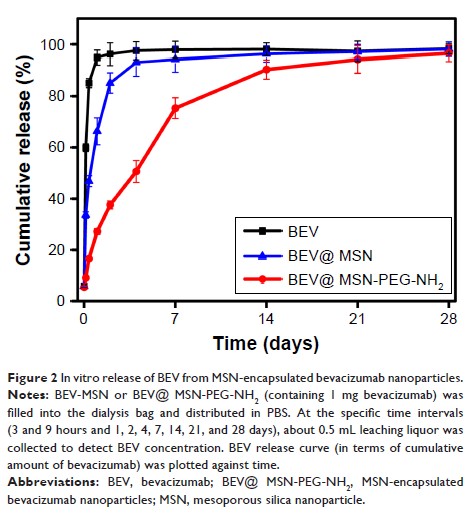108605
论文已发表
注册即可获取德孚的最新动态
IF 收录期刊
- 3.4 Breast Cancer (Dove Med Press)
- 3.2 Clin Epidemiol
- 2.6 Cancer Manag Res
- 2.9 Infect Drug Resist
- 3.7 Clin Interv Aging
- 5.1 Drug Des Dev Ther
- 3.1 Int J Chronic Obstr
- 6.6 Int J Nanomed
- 2.6 Int J Women's Health
- 2.9 Neuropsych Dis Treat
- 2.8 OncoTargets Ther
- 2.0 Patient Prefer Adher
- 2.2 Ther Clin Risk Manag
- 2.5 J Pain Res
- 3.0 Diabet Metab Synd Ob
- 3.2 Psychol Res Behav Ma
- 3.4 Nat Sci Sleep
- 1.8 Pharmgenomics Pers Med
- 2.0 Risk Manag Healthc Policy
- 4.1 J Inflamm Res
- 2.0 Int J Gen Med
- 3.4 J Hepatocell Carcinoma
- 3.0 J Asthma Allergy
- 2.2 Clin Cosmet Investig Dermatol
- 2.4 J Multidiscip Healthc

介孔二氧化硅纳米粒子作为改善抗血管生成治疗的传递系统
Authors Sun JG, Jiang Q, Zhang XP, Shan K, Liu B, Zhao C, Yan B
Received 21 November 2018
Accepted for publication 25 January 2019
Published 25 February 2019 Volume 2019:14 Pages 1489—1501
DOI https://doi.org/10.2147/IJN.S195504
Checked for plagiarism Yes
Review by Single-blind
Peer reviewers approved by Dr Cristina Weinberg
Peer reviewer comments 3
Editor who approved publication: Dr Linlin Sun
Purpose: Antiangiogenic
drugs usually have short-acting efficacy and poor treatment compliance. The
purpose of this study was to determine whether mesoporous silica nanoparticles
(MSNs) could be utilized as a nanodrug delivery system for improving
antiangiogenic therapy.
Materials and methods: MSN-encapsulated
bevacizumab nanoparticles were prepared by the nanocasting strategy and
characterized by Fourier transform infrared, transmission electron microscopy,
and Brunauer–Emmett–Teller method. Encapsulation efficiency and drug loading
efficiency of MSN-encapsulated bevacizumab nanoparticles were calculated. The
pharmacokinetics, cytotoxicity, and tissue toxicity were evaluated in vitro and
in vivo. The antiangiogenic effects of MSN-bevacizumab nanoparticles were
evaluated in vitro and in vivo.
Results: MSN
encapsulation could prolong the residency of bevacizumab in vitreous/aqueous
humor and maintain the long-lasting drug concentration. MSN-encapsulated
bevacizumab nanoparticles did not show any obvious cytotoxicity and tissue
toxicity. MSN-encapsulated bevacizumab nanoparticles were more effective than
bevacizumab in suppressing vascular endothelial growth factor-induced
endothelial cell proliferation, migration, and tube formation in vitro.
MSN-encapsulated bevacizumab nanoparticles showed sustained inhibitory effects
on corneal neovascularization and retinal neovascularization in vivo.
Conclusion: This
study provides a novel strategy of encapsulating bevacizumab to protect and
deliver it, which could increase the time between administration and formulation
shelf-life. MSN-encapsulated bevacizumab is a promising drug delivery
alternative of antiangiogenic therapy.
Keywords: mesoporous
silica nanoparticle, bevacizumab, ocular angiogenesis, antiangiogenic therapy
